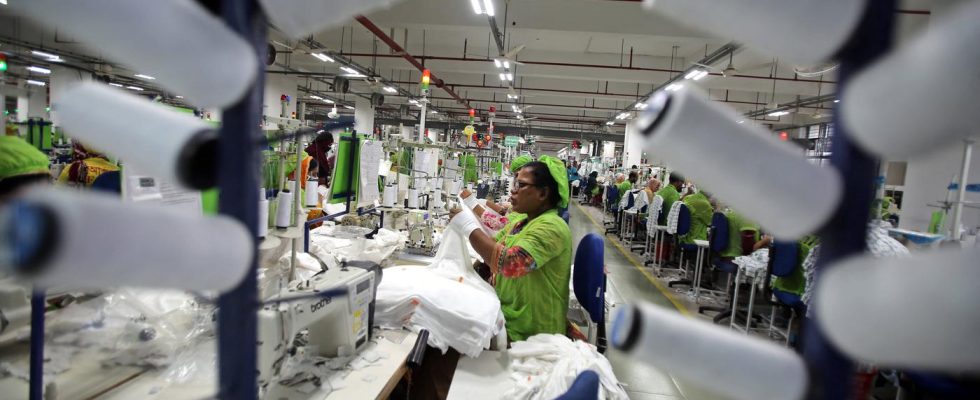Around 500 listeners came to the Leipzig Kupfersaal on Thursday to hear Christian Lindner. “Supply chain law now! Supply chain law now! Supply chain law now!” some of them keep shouting.
The Liberal University Group and the Friedrich Naumann Foundation have invited the Finance Minister. Around a dozen young people disrupt the event, chant, and sing against the FDP and Lindner. A buzzword, again and again: the supply chain law. “We already have one!” shouts Lindner from the stage with a view to the German supply chain law passed by the Bundestag in 2021: “A look at the law makes it easier to know the law.”
The climate activists managed to interrupt Lindner’s event for around 20 minutes. At around 3:45 p.m. police officers carried some of the activists out of the hall. When he then speaks, Lindner leaves no doubt about his party’s stance on the supply chain law. The project is “extremely bureaucratic”, “poorly crafted” and, on top of that, not at all in the interests of developing countries. Therefore, the EU draft law must be “fundamentally revised” after the European elections.
Despite the violent protests that Lindner met with in Leipzig, the Liberals at EU level will get their way in the dispute over the supply chain law. Germany wants to abstain from a vote on the law in Brussels this Friday. This means that the entire project could be stopped at EU level, in line with the FDP’s wishes.
We must not make the mistake of tying ourselves down with bureaucratic regulations.
Marco Buschmann (FDP), Federal Minister of Justice
The planned EU supply chain directive will allow large companies to be held accountable in European courts if child labor or forced labor occurs in their production and supply chains. In December, the EU Commission, European Parliament and member states agreed on a compromise for the EU law. At this point, the final vote in Brussels seemed to be just a formality – until the FDP objected.
Justice Minister Marco Buschmann (FDP) made it clear in a letter to his EU counterparts what reasons motivated the Liberals to veto them. “We must not make the mistake of tying ourselves down with bureaucratic regulations, because that would help no one,” wrote Buschmann.
Recommended editorial content
Here you will find external content selected by our editors to enrich the article with additional information for you. Here you can display or hide the external content with one click.
I agree that the external content can be displayed to me. This means that personal data can be transmitted to third-party platforms. You can find more information about this in the data protection settings. You can find these at the bottom of our page in the footer, so you can manage or revoke your settings at any time.
The Minister of Justice criticized, among other things, the fact that the EU supply chain law was so broad that the construction sector was also affected. The requirements of the planned directive could pose an “indirect threat” to the survival of small and medium-sized companies in the industry in particular, warned Buschmann.
The FDP’s top candidate for the European elections, Marie-Agnes Strack-Zimmermann, also stepped up in the coalition’s internal dispute over the EU directive. The agreement between the EU institutions in December was “not set in stone,” she told the Tagesspiegel. “The current draft is a bureaucratic monster that is impractical,” she added.
© dpa/Kay Nietfeld
It was already stated in the coalition agreement that “with us there will only be a supply chain law without additional, unreasonable burdens on small and medium-sized companies,” Strack-Zimmermann continued. However, in view of the present compromise, this is “not the case at all” and the additional bureaucracy “cannot be managed” by small and medium-sized companies.

© dpa/Michael Kappeler
Strack-Zimmermann also did not accept the accusation that the Liberals were threatening to overturn a European legislative project in the final stages. During the ongoing proceedings, the FDP had “pointed out several times at the European level” that the draft did not help human rights either.
The SPD and the Greens are in favor of the EU supply chain law, the FDP is against it – in this constellation, Germany is expected to abstain at EU level. It was unclear on Thursday how the vote on the supply chain law would go among the representatives of the 27 EU states and whether it would even come about. Four or five member states – including Germany – would abstain or vote against the law, it was said in Brussels.
This is not the first time this coalition has made a last-minute U-turn.
A EU diplomat
Due to the size of the population, Germany’s voting behavior is particularly important in EU votes. However, abstentions or votes against from several EU countries are necessary to block a project like the Supply Chain Act. Italy’s voting behavior, which initially remained open on Thursday, was considered crucial. Finally, it was also conceivable that the Belgian EU Presidency would postpone the final vote on the law.
Almost a year ago, a shift in European policy by the Liberals had caused quite a stir in Brussels. At that time, Transport Minister Volker Wissing (FDP) called for combustion engines to be approved beyond 2035, provided they are operated with new synthetic fuels (e-fuels). The end of combustion engines in Brussels from 2035 was more or less a done deal.
“It is not the first time that this coalition has made a last-minute U-turn,” said EU diplomatic circles. The first time, in the dispute over the end of combustion engines, it was an anomaly, but now we have to speak of a pattern. “Germany’s closest friends in the EU are losing trust in a reliable partner,” it continued.

